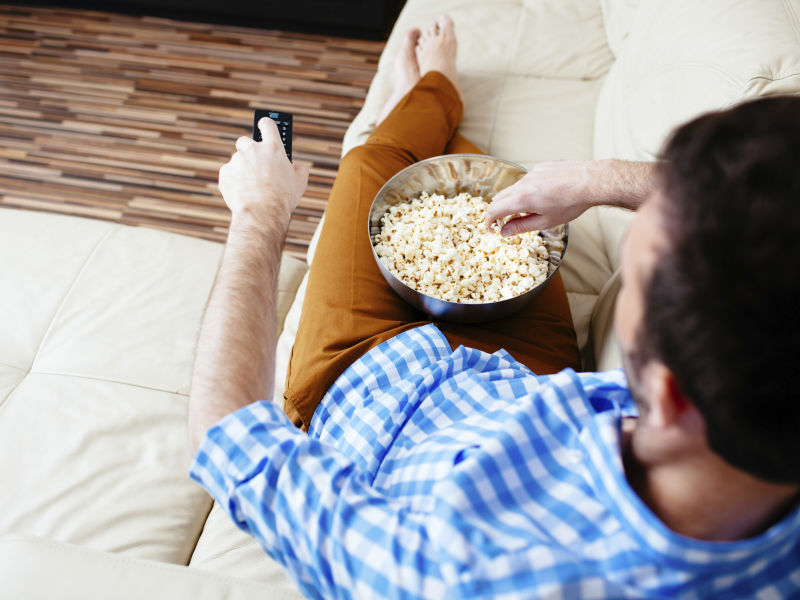University of Houston associate professor Temple Northup has looked at the relationship between food consumption and the number of hours spent in front of the television. Northup's study, published in the January 2015 issue of The International Journal of Communication and Health, surveyed 591 undergraduate students on their viewing, eating and drinking habits. Consistent with past studies, he found that the more people watched TV, the more they engaged in unhealthy eating. "The explanation is relatively straightforward — the act of watching TV is a sedentary activity that encourages snacking," says Northup, the interim director of the university's Jack J. Valenti School of Communication.
Lots of research shows mindless eating plays a prominent role in how much we ingest while distracted with what is happening on screen. "Watching TV while eating is also common behavior," says Cheung. "When we are distracted while eating, or eating mindlessly, we are not paying full attention to the food in front of us, and miss the satiety cues letting us know that we are full."
Overall viewing time is certainly a key factor. But the genre of what you are watching may also influence how much you munch. Researchers from Cornell University's Food and Brand Lab have found that action content (say, The Walking Dead) made subjects eat twice as much — 98 percent more, to be exact — than their counterparts who watched a talk show. And sad content (like the sci-fi drama Solaris) made participants eat 55 percent more than those who watched more upbeat content, like the romantic comedy My Big Fat Greek Wedding.
Researchers speculate that action and adventure shows may promote mindless eating because people consume more to keep up with the pace of the content. "It might be the level of distraction — how engaging the content is," says Aner Tal, a research associate at Cornell's Food and Brand Lab. "Another possibility is that it's the feelings associated with what you are watching. Specifically, anything that involves a stress reaction enhances people's levels of cortisol — and we know that leads to overeating."
With tearjerkers, the increase in snacking can be credited to stress responses but also to emotional eating, which compensates for sadness. "It makes you feel temporarily better," says Tal.
Less-obvious cues may also modify eating habits. A separate study from Cornell's Food and Brand Lab found that food-related content on television makes those who are watching their diet ("restrained eaters") eat more. Led by Food and Brand Lab Director Brian Wansink, the study found that, when subjects watched episodes of SpongeBob SquarePants in which the protagonist was selling chocolate bars, they ate more than their counterparts who watched an episode unrelated to food.
But you don't have to cancel Netflix and Hulu subscriptions to save your waistline. Cheung recommends separating food and television by unplugging while eating.
"To reduce mindless eating, one can practice mindful eating for more control over their relationship with food," says Cheung. "When eating, only eat. Turn off the television [and] computer, and put the cellphone away to refrain from checking messages. By removing these distractions, you can bring your full attention to the food in front of you, going beyond just taste and engaging all senses — including sight, smell, texture and the sound your food makes."
Tal, on the other hand, suggests you don't have to banish snacking while viewing. He says just be aware how television influences what you put in your mouth, and plan accordingly. "Monitor ahead of time what is there for you to eat. Put out healthier snacks on the table or not have snacks available," says Tal. "You can also substitute your snacks for healthier ones like vegetables."
Susmita Baral is a journalist based in New York City. She frequently writes about science, food and health.
Copyright 2016 NPR.
